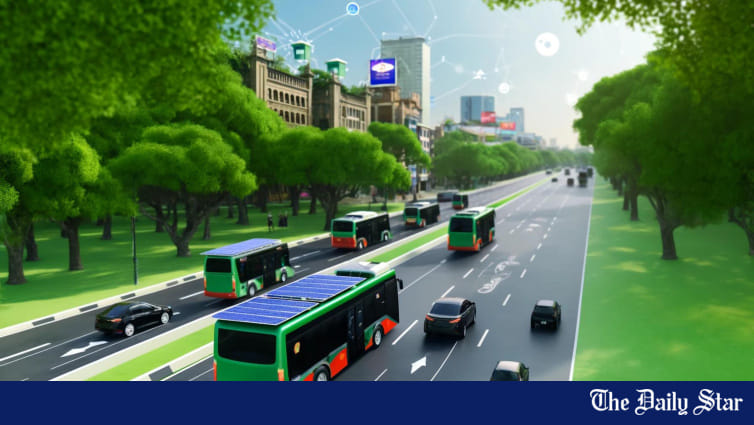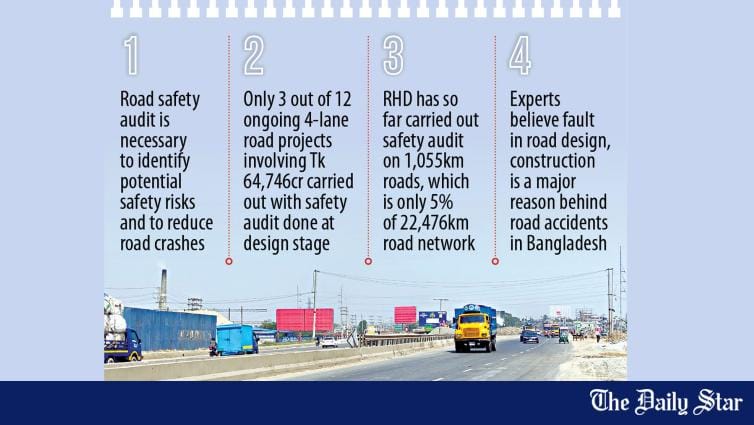Safety audit ignored in road projects
Absence of such inspection in road construction and expansion to increase risk of accidents
The Roads and Highways Department is implementing most of its projects to turn two-lane highways into four-lane ones without safety audits, which, according to experts, is a major compromise on road safety.
The RHD has 12 projects to double the width of a total of 835 km of highways at a cost of Tk 64,746 crore. Safety audits were done at the design stage of only three.
The RHD itself did the audits for one project while the financiers did it for the other two.
During road construction, crucial safety measures are taken on the basis of audit findings. In the absence of that, these newly widened roads may become deadlier, said Prof Hadiuzzman, former director of Accident Research Institute of Buet.
Safety audits must be carried out by independent auditors in the design, implementation and post-construction phases, he added.
The RHD has carried out safety audits on only 1,055km roads, meaning over 95 percent of its 22,476km roads have never been audited.
Road safety audits are a systematic, formal, and thorough assessment that identifies potential risks on an existing or planned road and recommends measures aimed at reducing crashes.
The compromise on safety is happening at a time when the number of deadly crashes are rising every year.
According to Bangladesh Road Transport Authority, at least 5,024 people were killed in 5,425 crashes last year. Several road safety campaigners say the actual numbers are much higher.
Road design faults are a major cause of crashes, experts say. Road Transport Act-2018 recognises faults in road design, construction or maintenance as offences.
The RHD is updating its guideline for road safety audits. Once the preparatory work is done, the agency will launch a large-scale audit on roads, officials said.
As per the RHD Management Plan, RHD's Road Design and Safety Circle will do the audits on the national, regional, and major feeder roads and bridges.
According to Prof Hadiuzzman, widening the roads would accelerate socio-economic development, but it is unfortunate that safety audits are missing.
No proper safety audit was done on Dhaka-Mawa-Bhanga Road, the first expressway of the country, he said.
On wider roads, motorists tend to drive faster and this increases crashes, he said.
Since the environment surrounding roads changes over time, safety audits on the existing roads should be done at reasonable intervals, he added.
EXPANSION WITHOUT SAFETY AUDIT
Currently, RHD is implementing at least 12 projects to turn almost 800 roads into four-lane highways.
The roads being widened are 210km Dhaka-Sylhet, 190km Tangail (Elenga)-Rangpur, 48km Jashore-Jhenaidah, 56km Sylhet-Tamabil, 51km Akhaura-Ashuganj, 50km Cumilla (Mainamati)-Brahmanbaria (Dharkhar), 43km Sylhet-Sheola, 20km Panchdona-Ghorashal, 50km Feni-Noakhali, 59km Cumilla-Noakhali, 10km Jatrabari-Demra road, and 48km Dhaka Bypass.
RHD sources said safety audits were carried out at the design stage only for Dhaka-Sylhet Highway; Sylhet-Sheola Highway; and Dhaka Bypass Road.
RHD carried out the audit for Dhaka-Sylhet Highway. The auditors' recommendations included adding overpasses at busy intersections which would require around Tk 3,000 crore. As the authority does not have the money, it is uncertain whether the recommendation would be implemented.
The World Bank as the financier did the audit for Sylhet-Sheola project. The private partners of Dhaka Bypass Road Project, which is being implemented under a public private partnership model, carried out an audit for this project.
Seven of the 12 projects are being implemented with foreign loans, one under PPP and four with government funds. This correspondent talked to officials of all the 12 projects.
Some of them said feasibility study and detailed design of most of the projects that are now being implemented were done under a separate project funded by Asian Development Bank.
But the provision for safety audit was not in the ADB-funded project, they said.
Consultants hired under the ongoing projects made some reviews of the design, and in some cases, recommended measures for road safety. But these are not enough to make the roads safe.
ONLY 5 PERCENT AUDITED SO FAR
There are 22,476km road in the RHD network. Of this, 3,991km are national highways, 4,897km regional highways and 13, 558km district roads, according RHD's 2022-23 annual report.
The RHD carried out a large-scale road safety audit for the first time in 2017-18 fiscal year when it audited 500km of five national highways.
Apart from giving recommendations for fixing safety issues, the audit report also called for completing safety audits on the remaining national highways.
In the 2018-19 fiscal year, the RHD carried out an audit on 300km of three highways, and in the 2021-22 fiscal year, it audited 255km of two highways.
Tanvir Siddique, superintendent engineer (road design and safety circle) of RHD, said safety audits were being done gradually with priority on national highways.
Lack of human resources and funds are the main reasons why more audits are not done, he said.
RHD Chief Engineer Syed Moinul Hasan said post-construction safety audit is more important than audit at the design stage.
"We are giving more emphasis on post-construction audit," he told The Daily Star last week.
There is a serious scarcity of people with proper expertise on safety audits, he said.
"However, we are planning to pursue a large-scale [safety audit] activity soon," he added.
WHAT IS THE PLAN?
Under the Dhaka-Sylhet Highway improvement project, RHD is now preparing a manual with checklists for carrying out safety audits.
"We want to make road safety audits mandatory for projects," said Dhaka-Sylhet Project Director AK Mohammad Fazlul Karim.
He said they were also preparing a roadmap for carrying out a safety audit.
For example, which road will be audited first and what would be the procedure to certify to a person as eligible for safety audit will be mentioned in the road map, he said.
Drafts of the manual and roadmap have already been sent to the stakeholders concerned, he added.










